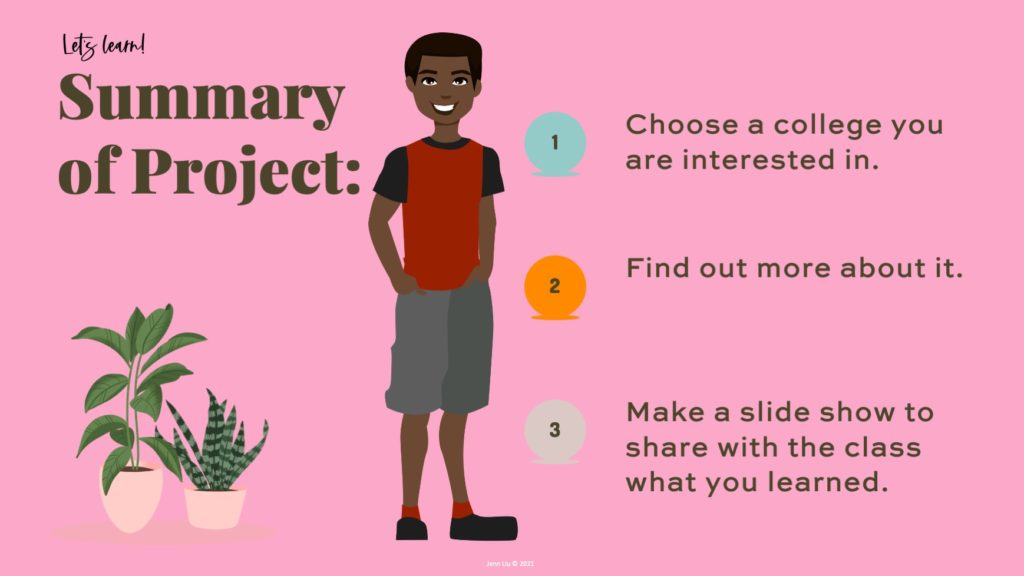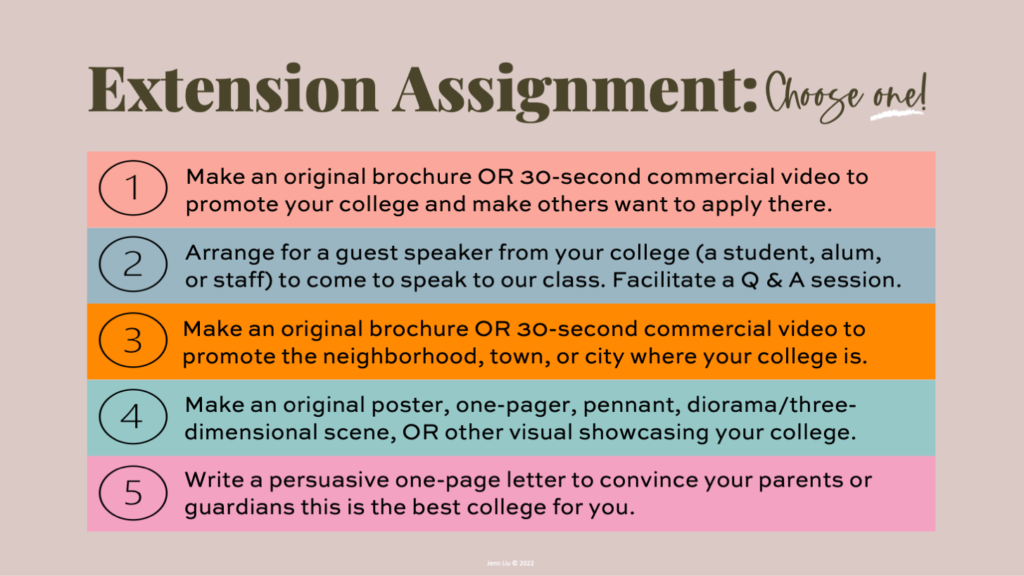Let’s be frank. You don’t need college research project ideas.
You’re a rock-star teacher and can easily come up with project ideas if you just sit to think about it for a minute (e.g., college info displayed on a poster, brochure, Google Slides, display board, pennant, one-pager, whatever current holiday-themed object (e.g., winter-themed), or in a PSA or commercial, yadda yadda yadda).
What you need is a package deal — a ready-to-go, done-for-you lesson so you can hit everything else on your to-do list and rest assured your students are engaged as they explore college choices.
But really, you ask, how do you decide what kind of college research project to assign your students to help them learn more about potential colleges?
Okay, fine. It’s simple.

First, require all your students to do some basic research on one of their top college choices and ask them to put that information into a slide show or Google Doc (I like slide shows because they’re better for presentation purposes). You will need a list of what you want students to find out.
Here is my list:
(feel free to steal it — just copy and paste to a Google Doc; you’re not actually stealing because I said freeeee; and no, you don’t need to require all of this)
1. School Name: What is the official name of the college you are interested in?
2. Quick Facts/Type of College: Public, private, or for-profit college? Two-year or four-year? Size of the student body? Single-sex or co-ed? Religious affiliation?
3. Location: What is the name of the town or city where the college is located (include a map and picture) and is it urban, suburban, or rural? (you may also add weather info)
4. Student Demographics: What is the age and male/female breakdown of the undergraduate student population? What is the percentage of students of color? (you may also include ethnic and/or religious breakdown if this matters to you)
5. Academics and Reputation: Which programs is the college known for? How does the college rank in its category (e.g., national university, national liberal arts college, etc.)? What is the average GPA of incoming Freshmen? Average SAT and ACT scores?
6. Admission Requirements: What do you need to submit to apply (application, transcripts, recommendations, test scores, personal statement essay, etc)? Does this school have its own application or use the Common App?
7. Selectivity: Give percentage and number of how many students apply each year and how many are accepted. How selective/competitive is this school?
8. Costs: What is the cost of tuition, fees, room, board, books, etc?
9. Affordability: What type of financial aid do students receive? What percentage receive financial aid?
10. Retention and Graduation Rates: What percentage of students continue after their first year and what percentage graduate within six years?
11. Campus Life and Social Atmosphere: What activities, clubs, intramural sports, campus services, etc. does the school offer? Is it a residential or commuter campus? Greek life (fraternities and sororities)? Political leaning (liberal or conservative)?
12. Fun Fact: What is something interesting about this college not mentioned above?
13. Campus Tour: Find a 2-5-minute campus tour video on the school’s website or Youtube and copy the video link.
14. Personal Insight: Call and interview someone at the school (e.g., an admissions guide or officer, counselor, or current student) or someone who attended the school and state who you interviewed and the main things you learned.
15. Comparisons: Compare this college to two other colleges you are interested in using three criteria that are important to you (e.g., size, location, academics, selectivity, costs, retention rate, etc.). Make a table to show your comparison.
16. Pros and Cons: What are three pros and three cons of attending this school?
17. Reflect and Assess Slide: What was the most useful or interesting thing you learned? How much are you considering applying to this college? What is your current plan? What are you still wondering about?
Then to extend the project, you could give your students some creative project choices. Choices are great to get more buy-in from students and make them feel more ownership (which you knew already :-)).
Helpful Tip:
To prevent “analysis paralysis,” I wouldn’t give your students more than five choices. These are my favorite extension projects to let students choose from:

So how do you present this project to students?
I follow this simple 5E lesson plan:
1. Essential Question: Start with your EQ, such as “What can we learn from researching colleges?”
2. Engage/Hook: Hook your students with a relevant quote about college or the importance of exploring your options and allow them to “think-write-pair-share” about it either in person (you could pass out Post-its for writing answers to put up on the board), in an online chat if you are presenting in a video conference, or you may add a link to where you want them to post their responses (e.g., Jamboard).
3. Explore/Activate Prior Knowledge: Ask your students what they think is important to consider when choosing colleges to apply to. To get your students to explore the topic further and stimulate critical thinking, also have them share questions they have.
4. Explain/Learn/Direct Instruction: Review the points you want students to research about their colleges. Be sure to explain terms such as retention and graduation rate.
Note: If your students haven’t already chosen colleges, then teaching them how would be the first step of this lesson plan.
5. Extend: The extension for this lesson is the project itself (or choosing a college and then completing the project), but you could also add “extra” extension activities, either for extra credit or as required assignments. For example, you can have your students make video infomercials about their colleges and even make it a contest and vote on who has the best infomercial. You could also have your students make brochures, display boards, or posters featuring their colleges. Some teachers like to have students make pennants or tissue box displays with their college information.
6. Reflect and Assess: This is the “evaluate” part of this 5E lesson in which you could ask your students to reflect on the college they researched and share this with the class. This also provides you with a tool to collect feedback/data to inform your instruction.
Would you like a Google Slides presentation to explain this project to your students and a rubric/scoring guide? Click HERE. Or, you may want to get my College Research Bundle, which includes:
1) a Google Slides presentation on how to choose a college,
2) interactive worksheets to help your students follow suggested steps for building a college list and finding a college, and
3) Google Slides explaining the research project.
How much time will all this take?
Of course, this will depend on your goals and how much time you have. If possible, I would allow at least one class to talk about how to choose a college, about a week for your students to explore different colleges, half an hour to explain the project to the class, and then about two weeks for your students to work on their projects and another week for student presentations. That’s a whole month. Have fun!

If you found this article helpful, share it with your teacher friends and colleagues!
Bold font